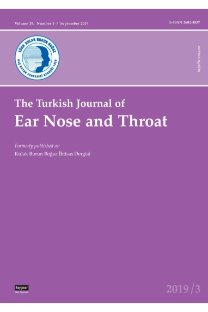Outcomes of masking and habituation therapy with the implementation of a new sound therapy protocol
Habituation hyperacusis, masking therapy, tinnitus, tinnitus retraining therapy,
___
- Davis P. Living with Tinnitus. Rushcutters Bay, NSW: Gore & Osment; 1995.
- Eggermont JJ, Roberts LE. The neuroscience of tinnitus. Trends Neurosci 2004;27:676-82.
- Jastreboff PJ. Phantom auditory perception (tinnitus): mechanisms of generation and perception. Neurosci Res 1990;8:221-54.
- Jastreboff PJ, Hazell JWP, editors. Tinnitus retraining therapy: implementing the neurophysiological model. New York: Cambridge University Press; 2004.
- Jastreboff PJ. 25 years of tinnitus retraining therapy. HNO 2015;63:307-11.
- Tunkel DE, Bauer CA, Sun GH, Rosenfeld RM, Chandrasekhar SS, Cunningham ER Jr, et al. Clinical practice guideline: tinnitus executive summary. Otolaryngol Head Neck Surg 2014;151:533-41.
- Baldo P, Doree C, Molin P, McFerran D, Cecco S. Antidepressants for patients with tinnitus. Cochrane Database Syst Rev 2012;2012:CD003853.
- Beckers T, Wagemans J, Boucart M, Giersch A. Different effects of lorazepam and diazepam on perceptual integration. Vision Res 2001;41:2297-303.
- Bütefisch CM, Davis BC, Wise SP, Sawaki L, Kopylev L, Classen J, et al. Mechanisms of use-dependent plasticity in the human motor cortex. Proc Natl Acad Sci U S A 2000;97:3661-5.
- Kiliç C, Curran HV, Noshirvani H, Marks IM, Başoğlu M. Long-term effects of alprazolam on memory: a 3.5 year follow-up of agoraphobia/panic patients. Psychol Med 1999;29:225-31.
- Thiel CM, Henson RN, Morris JS, Friston KJ, Dolan RJ. Pharmacological modulation of behavioral and neuronal correlates of repetition priming. J Neurosci 2001;21:6846-52.
- Vernon J, Schleuning A. Tinnitus: a new management. Laryngoscope 1978;88:413-9.
- Oz I, Arslan F, Hizal E, Erbek SH, Eryaman E, Senkal OA, et al. Effectiveness of the combined hearing and masking devices on the severity and perception of tinnitus: a randomized, controlled, double-blind study. ORL J Otorhinolaryngol Relat Spec 2013;75:211-20.
- Smith PA, Parr VM, Lutman ME, Coles RR. Comparative study of four noise spectra as potential tinnitus maskers. Br J Audiol 1991;25:25-34.
- Hazell JW, Wood SM, Cooper HR, Stephens SD, Corcoran AL, Coles RR, et al. A clinical study of tinnitus maskers. Br J Audiol 1985;19:65-146.
- Ogut F, Mercan GC, Ozturk K, Bilgen C, Kilic MA, Pehlivan M, et al. Outcomes of Tinnitus Masking Therapy in Patients Selected Based on Audiological and Psychological Criteria. Int Adv Otol 2012;8:413-8.
- Hobson J, Chisholm E, El Refaie A. Sound therapy (masking) in the management of tinnitus in adults. Cochrane Database Syst Rev 2012;11:CD006371.
- Hazell JWP, Sheldrake JB, Meerton LJ. Tinnitus masking: is it better than counseling alone? In: Feldmann H, editor. Proceedings of the Third International Tinnitus Seminar. Karlsruhe: Harsch Verlag; 1987. p. 239-50.
- Sweetow RW, Sabes JH. Effects of acoustical stimuli delivered through hearing aids on tinnitus. J Am Acad Audiol 2010;21:461-73.
- Duckert LG, Rees TS. Placebo effect in tinnitus management. Otolaryngol Head Neck Surg 1984;92:697-9.
- Jastreboff PJ, Jastreboff MM. Tinnitus Retraining Therapy (TRT) as a method for treatment of tinnitus and hyperacusis patients. J Am Acad Audiol 2000;11:162-77.
- Melin L, Scott B, Lindberg P, Lyttkens L. Hearing aids and tinnitus--an experimental group study. Br J Audiol 1987;21:91-7.
- Miller MH. Tinnitus amplification: the high frequency hearing aid. J Laryngol Otol Suppl 1981;4:71-5..
- ISSN: 2602-4837
- Yayın Aralığı: Yılda 4 Sayı
- Başlangıç: 1991
- Yayıncı: İstanbul Üniversitesi
Nurullah SEYHUN, Ebubekir TOPRAK, Egehan SALEPCİ, Kerem Sami KAYA, Senem Kurt DİZDAR, Suat TURGUT
Outcomes of masking and habituation therapy with the implementation of a new sound therapy protocol
İsa KAYA, Fatih ÖĞÜT, Sercan GÖDE, Göksel TURHAL
Şenol ACAR, Hakan AVCI, Mehmet Melih ÇİÇEK, Beldan Polat, Kadir Serkan ORHAN
Hakan KARA, Can DORUK, Bora BAŞARAN
Saim PAMUK, Ahmet ÖZKAN, Beldan POLAT
Kadir Serkan ORHAN, Cömert ŞEN, Levent AYDEMİR, Mehmet ÇELİK, Meryem Nesil KELEŞ TÜREL
Evaluation of cochlear implantation effects on middle ear pressure
Beldan POLAT, Hakan AVCI, Şenol ACAR, Mehmet Melih ÇİÇEK, Kadir Serkan ORHAN
Seyfettin ASLAN, Yasin ÇETİNKAYA, Mehmet ÇELİK
Hyperbaric oxygen therapy: The last remedy for sudden sensorineural hearing loss?
Aslı ÇAKIR ÇETİN, Hülya ELLİDOKUZ, Günay KIRKIM, Enis Alpin GÜNERİ, Yüksel OLGUN, Fatih Yunus EMRE
